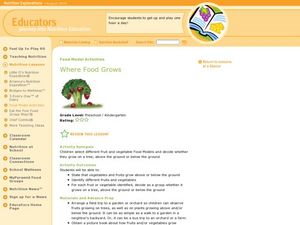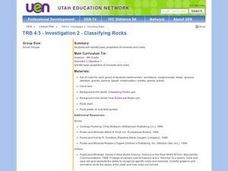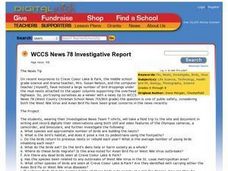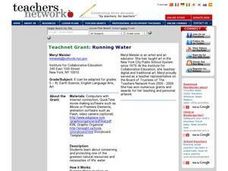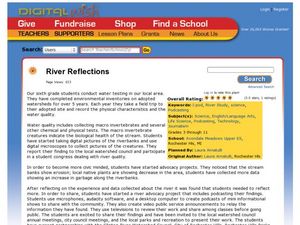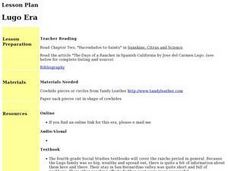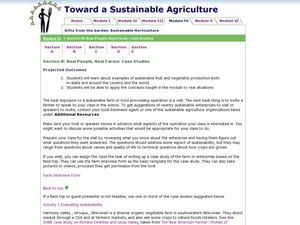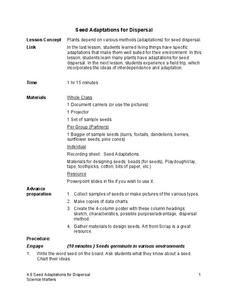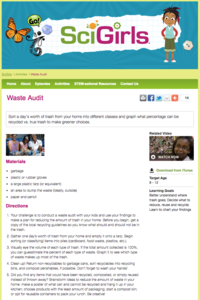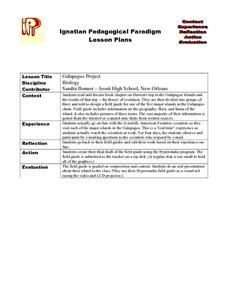Curated OER
Where Food Grows
Learners identify how vegetable plants grow. In this plant lesson, students brainstorm different fruits and vegetables and read the book Growing Vegetable Soup. Learners visit a garden and observe how vegetables grow.
Curated OER
What Does it Take to be a Survivor: Part 2
Students explore adaptation by completing worksheets. In this fish anatomy instructional activity, students identify the different survival strategies fish utilize to live in the ocean and the adaptation their bodies have gone through...
Curated OER
Nothing New? A Physical Change
Fifth graders discuss the differences between chemical and physical changes. In groups, they complete experiments and discover how a physical chnage can be reversed. To end the lesson, they review the steps of the water cycle and...
Curated OER
Investigation 2 - Classifying Rocks
Fourth graders identify basic properties of minerals and rocks. They access websites and utilize worksheets imbedded in this lesson to further their understanding of rock classification.
Curated OER
WCCS News 78 Investigative Report
Students role play the role of investigative reporters. In groups, they determine what type of bird is leaving its droppings on the overhead highway beams. They answer a given set of questions and present their conclusions to the class....
Curated OER
Running Water
Sixth graders create products that feature the importance of water conservation. In this environmental stewardship lesson, 6th graders explore the water cycle and conduct on water usage. Students also research water pollution and...
Curated OER
Take A Walk On The Wildside
Students study big cats in a variety of lessons included in this unit.
Curated OER
The Importance of Trees in the Rural Area: Planting a Snowfence
Students explore the concept of living snowfences. In this tree lesson, students read, "The Living Tree," brochure and discuss the ecological benefits of planting trees to create living snowfences. Students draw plans for planting trees...
Curated OER
Drift Study
Students observe, work with charts, and work with GPS in order to determine the path lobster larvae travel based on local currents. In this currents lesson plan, students work with local fishermen to observe the natural currents.
Curated OER
Trout In The Classroom
Pupils have trout in their classroom and complete journaling, checklists, temperature checking, and ammonia level recording. In this trout lesson plan, take weekly observation records of their trout.
Curated OER
Las Vegas: We Are Just Like You
Students practice making multimedia documentary films by investigating cities of America. In this U.S. geography lesson plan, students examine Las Vegas and compare the state of Nevada to 15 other states and discuss their main...
Curated OER
River Reflections
Sixth graders create podcasts and video public service announcements. In this environmental advocacy lesson, 6th graders study the local watershed and become advocates for their local environment. In the process, they create podcasts and...
Curated OER
If I Were A Raindrop!
Students review the water cycle. In this water cycle lesson, students review the different stages of the water cycle. Students use the computer program Kid Pix Weather to help demonstrate understanding.
Curated OER
Big Cat Classification
First graders discover the different names and classifications of big cats by using word processing applications. In this animal life lesson plan, 1st graders investigate one big cat and create a database of facts about it using an word...
Curated OER
Pick It Up!
Students investigate recycling by creating receptacles that can hold trash or recyclable items. In this graphic design lesson plan, students encourage their classmates to help save the environment by using a recycling receptacle they...
Curated OER
A WebQuest about Ocean
Fifth graders explore the realm of an ocean through an ocean WebQuest. The Problem Based Learning Theory is used within this lesson. They complete several activities on the different concepts of oceans. Students are challenged to solve...
Curated OER
Sense Of Place
Young scholars study ecology, listen to speakers and research conservation topics. In this investigative lesson students discuss wilderness resources, learn about Native Americans and participate in activities that help them to better...
Curated OER
Lugo Era
Fifth graders learn about the Lugo Era and how they lived by creating some materials that were used during that time. In this Lugo Era lesson, 5th graders use crafts to create items used during that era. They also learn songs and dances...
Curated OER
Real People, Real Farms: Case Studies
Students examine sustainable fruit and vegetable production. In this agriculture lesson students apply what they learn to real life situations.
Curated OER
Rocks and Minerals
Review the difference between rocks and minerals using this resource. Learners identify and investigate the physical properties of these objects. They create a Venn diagram to compare and contrast types of rocks. This is a motivating way...
Science Matters
Seed Adaptations for Dispersal
After a grand conversation about seeds, adaptation, and dispersal, scholars work collaboratively to examine seeds and record their findings on a four-column chart. Small groups share their observations and further discuss seed...
National Mississippi River Museum & Aquarium
Sun Printing
Ozalid acid paper is sensitive to the light. It reacts by getting darker, and it's the same paper photographers use when they print their pictures. Here, kids get to use photo-sensitive paper to create sun prints to find out how useful...
PBS
Waste Audit
Does everything in the trash can belong there? Conduct a waste audit with your class by collecting a day's worth of garbage, separating it into recyclables, non-recyclables, or food waste, and properly distributing what they find into...
Curated OER
Galapagos Project
Young scholars explore Darwin's trip to the Galapagos Islands. In groups, students create a field guide for one of the five major islands in the Galapagos.


